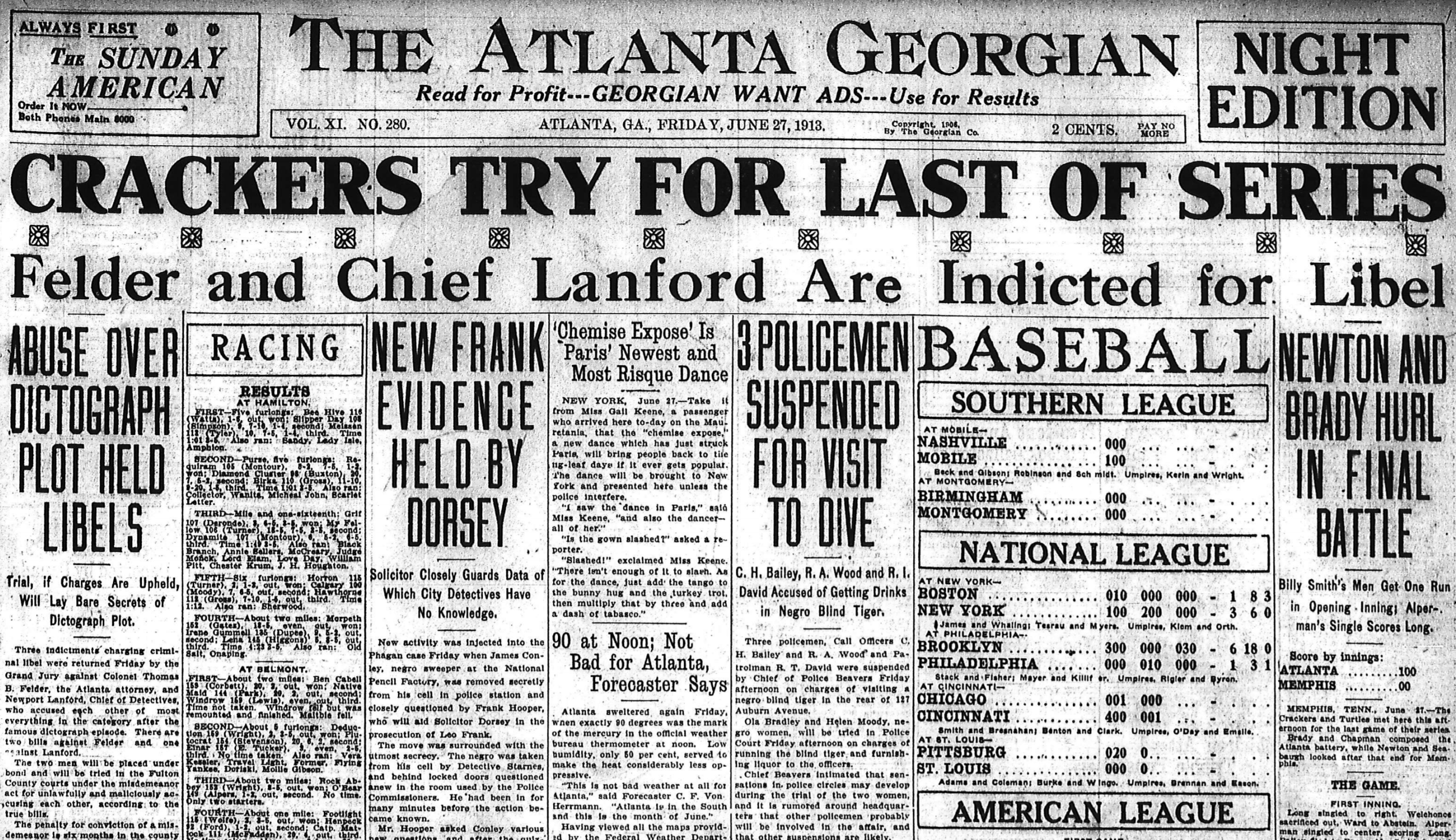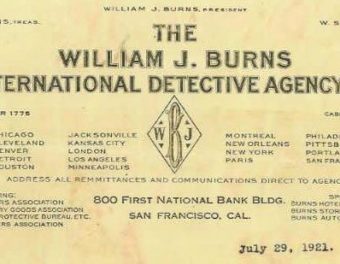 Another in our series of new transcriptions of contemporary articles on the Leo Frank case.
Another in our series of new transcriptions of contemporary articles on the Leo Frank case.
The Atlanta Georgian
Friday, June 27, 1913
Solicitor Closely Guards Data of Which City Detectives Have No Knowledge.
New activity was injected into the Phagan case Friday when James Conley, negro sweeper at the National Pencil Factory, was removed secretly from his cell in police station and closely questioned by Frank Hooper, who will aid Solicitor Dorsey in the prosecution of Leo Frank.
The move was surrounded with the utmost secrecy. The negro was taken from his cell by Detective Starnes, and behind locked doors questioned anew in the room used by the Police Commissioners. He had been in for many minutes before the action became known.
Mr. Hooper asked Conley various new questions, and after the quizzing was over hurried away from the police station.
Dorsey Has New Evidence.
It was the first time that Hooper had questioned the negro.
That a mass of evidence which the Atlanta detective force had no part in getting, and of which the members have had no knowledge, will be presented at the trial of Frank by Solicitor General Dorsey became known Friday.
Developments revealed that the Solicitor, through his personal investigation and that of his “greatest detective,” has discovered a number of persons whose names have not been connected with the mystery in any way by the local detectives. From these persons the Solicitor has obtained much evidence which will be made public for the first time when Frank is put on trial for his life.
Detective Identified.
Mr. Dorsey for a time engaged the services of a well-known detective whose name he kept carefully a secret, but whose identity was disclosed Friday by The Georgian’s Houston, Tex., correspondent as Frank Pond, who was connected with the Pinkerton forces for a number of years. Pond is now in Houston, where he was seen by a reporter.
It is understood Pond was shadowed by the Atlanta detectives all the ten days he was working on the case for the Solicitor. He is said to have registered at eight different hotels under as many different names. At the Coroner’s inquest he sat by the Solicitor and no one present except Mr. Dorsey knew who he was.
Did Work Before Inquest.
Pond did most of his work before the inquest. Before coming to Atlanta he was in Asheville, N. C., on a private case. In connection with the case, he was obliged to come to this city, and while here met Solicitor Dorsey. The Solicitor obtained the consent of Pond’s employer to the plan of having the detective work on the Phagan mystery for ten days or two weeks.
Pond, by a process of elimination, reached the decision that Frank was the only person who could have committed the crime, but this was before it had been discovered that Conley was in the factory and drunk at the time of the crime.
One of the witnesses who will be called by the Solicitor, of whose testimony the detectives evidently have had no knowledge, is Mrs. May Barrett. The Solicitor is believed to regard her statements as of great importance.
Daughter Says She Knows.
Mrs. Barrett is the woman who several weeks ago came, screaming, from the offices of the Solicitor and crying that someone had been telling lies about her.
Mrs. Barrett’s daughter, Mrs. George Bailey, had told the officials that her mother knew more about the mystery than she had disclosed. This led to the questioning and the woman’s hysterics. She was brought to the office[…]
Continued on Page 2, Column 8.
DORSEY GUARDS VITAL FRANK EVIDENCE
His Detective Found Facts, It Is Said, Local Sleuths Missed, Which He Will Present.
Continued From Page 1.
[…]on another day and this time she emerged from the office of the Solicitor quietly, and the impression was that she told the Solicitor all she knew of the case. She has been called to his office several times since and questioned.
Mrs. Barrett’s name was mentioned in a puzzling manner in the testimony of Miss Corinthia Hall at the Coroner’s inquest.
Miss Hall was asked if she had not seen Mrs. Barrett on the fourth floor on the day of the crime and if later, in telling of the incident to A.P. Hayes, she had not said that Mrs. Barrett had some sacks in her hand and was confused when she was asked what she was doing with them.
What the purpose was in this line of interrogation never has been explained.
The conversation with Mrs. Barrett must have occurred before Mary Phagan entered the factory, and what bearing the incident could have had on the strangling remains a mystery to the public, although the Solicitor may have the secret in his possession.
* * *
